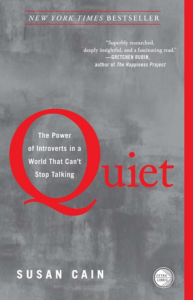 Imagine my delight when I discovered this book, Quiet by Susan Cain, which had been on my “To Read” list for months, nestled on my husband’s bookshelf. The idea of a “Quiet Revolution” is hugely appealing to me as a lifetime introvert who fully feels the effects of living in a “world that can’t stop talking.”
Imagine my delight when I discovered this book, Quiet by Susan Cain, which had been on my “To Read” list for months, nestled on my husband’s bookshelf. The idea of a “Quiet Revolution” is hugely appealing to me as a lifetime introvert who fully feels the effects of living in a “world that can’t stop talking.”
There are parts of this book that spoke to my heart — that seemed to understand me at the core. Rather than thinking there is something innately wrong with me, she has shown me that I simply don’t align to the Extrovert Ideal and . . . that’s ok. As an introvert, I have my own set of strengths in terms of how I understand people, delve into details, think deeply, and speak meaningfully.
There are some parts of this book that are not as strong. For example, where Ms. Cain ventures into some psychosocial research that seems to be misinterpreted by her, perhaps pointing out where she stretched beyond her core set of knowledge.
However, those areas do not dampen the overall message of understanding and acceptance. For instance, she has helped me to turn my view of my career and what makes sense for me completely on its head. (You might have read a bit about this in my previous post.) Rather than thinking that some how I’ll thrive in a noisy office with no walls, no privacy, and constant chatter, what if I look for work situations that provide an environment that nurtures thinking and creativity by AT LEAST making quiet recharge events possible?
This is another wonderful insight that Ms. Cain really drives home. That introverts can work highly effectively in an extroverted role as a performer, teacher, or news anchor, however, they will need “restorative niches.” If you’re an introvert, you might notice that you’ve naturally carved those out for yourself. Perhaps you have a reading chair that you go to “get away from it all” and recharge. Or maybe you hide in the basement doing laundry where you know no one will disturb you. Or maybe your recharge time is a dog walk or a quiet drive home from work – radio off, just you and your thoughts.
I also have taken to heart her advice that is actually given for parents whose child is an introvert. She recommends that those children arrive early to parties to acclimate to the setting and to feel in charge of the situation. I have often arrived late at parties out of a certain avoidance of this situation I’m supposed to like, but dread a little. I do fine when I’m there as I’ve had plenty of practice in these situations and it turns out the people are fascinating! However, I’m going to try this arriving early technique at a party I’m attending at the end of the month and see how that feels instead. I can imagine it will be more comfortable for me overall (especially as there are two people attending who I really want to get to know better).
It’s funny to notice people’s reactions to my deepest introverted desires and needs. Some clearly seem offended as if I’m rejecting them and people overall. This is not my intention. I love interacting with people, getting to know them, and sharing experiences and conversation. However, I also love being alone at times and the quiet of the rain upon the roof.
Where do you fall on the introvert/extrovert spectrum? Have you read Ms. Cain’s book and joined the Quiet Revolution?
Please let us know in the comments below.
